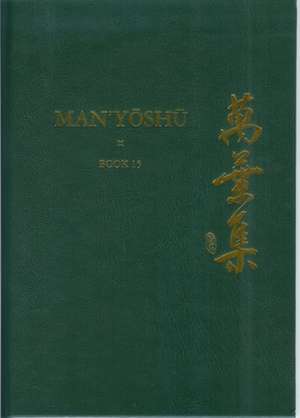Man’yōshū (Book 15): A New Translation Containing the Original Text, Kana Transliteration, Romanization, Glossing and Commentary: Man’yōshū, cartea 15
Alexander Vovinen Limba Engleză Hardback – 31 iul 2009
The entire translation will consist of 20 volumes, paralleling the original twenty books. The first to be published is volume 15 (announced here) one of six books written mostly in phonographic script. The author argues that the importance of book 15 lies in the fact that it contains a large number of Western Old Japanese grammatical forms and constructions that are not attested in any other Western Old Japanese text, but are extremely important in understanding this language, thereby providing a valuable foundation for all the other Man’yōshῡ texts, including those written in semantographic text. The publication sequence and anticipated dates of the remaining volumes will be announced at a future date.
Preț: 491.06 lei
Preț vechi: 606.25 lei
-19% Nou
Puncte Express: 737
Preț estimativ în valută:
93.99€ • 102.13$ • 79.01£
93.99€ • 102.13$ • 79.01£
Carte indisponibilă temporar
Doresc să fiu notificat când acest titlu va fi disponibil:
Se trimite...
Preluare comenzi: 021 569.72.76
Specificații
ISBN-13: 9781906876036
ISBN-10: 1906876037
Pagini: 219
Dimensiuni: 174 x 246 x 23 mm
Greutate: 0.61 kg
Editura: Brill
Colecția Brill
Seria Man’yōshū
Locul publicării:United Kingdom
ISBN-10: 1906876037
Pagini: 219
Dimensiuni: 174 x 246 x 23 mm
Greutate: 0.61 kg
Editura: Brill
Colecția Brill
Seria Man’yōshū
Locul publicării:United Kingdom
Notă biografică
Alexander Vovin a Russian-born American historical linguist and philologist currently holding the position of Directeur d’études at the Ecole des hautes études en sciences sociales (Centre de recherche sur les langues de l’Asie Orientale) in Paris. He has previously held appointments at the Institute of Oriental Manuscripts in St. Petersburg (1983-1989), the University of Michigan (1990-1994), the Miami University (1994-1995), and the University of Hawai’i (1995-2013). Alexander Vovin’s main interests include the early history of Japanese, Mongolian, Korean, Ainu, Manchu and other Inner and East Asian languages, as well as the early ethnolinguistic history, textology, and literature (especially poetry) of these regions. He is an author or an editor of about 100 articles and seventeen books including A Reconstruction of Proto-Ainu (Brill 1993), A Reference Grammar of Classical Japanese Prose (Routledge 2003), Koreo-Japonica (University of Hawai’i Press 2010), and A Descriptive and Comparative Grammar of Western Old Japanese (a revised edition of which will appear in Brill’s HdO series in 2020). Together with Dieter Maue, Alexander Vovin has discovered and deciphered the earliest Mongolic language from the 6th-7th centuries AD, pushing back our knowledge of known Mongolian text by seven centuries. He is also the editor of Brill’s series Languages of Asia (2003-) and co-editor (with Prof. Juha Janhunen, Finland) of the International Journal of Eurasian Linguistics (Brill 2019-). Alexander Vovin honors being elected as member of the Academia Europaea (2015), receiving the 2015 prize of the Japanese National Institute for Humanities, and receiving a European Research Commission Advanced Grant for the multinational project An Etymological Dictionary of the Japonic Languages (2019-2023).








